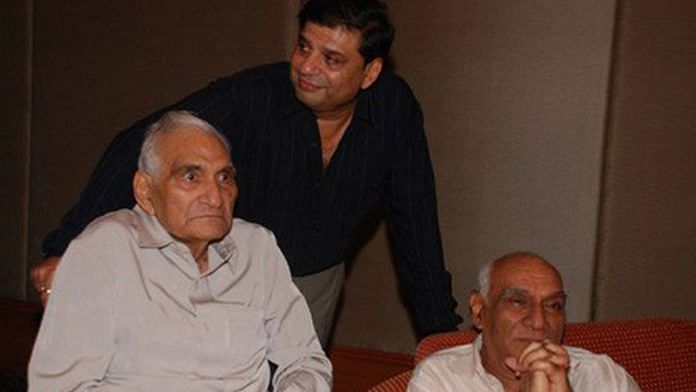New Delhi: The Chopra family is Bollywood royalty, just like the Kapoors and Khans. But unlike the latter two, the Chopras are a league higher because they’re not the pretty faces you see on screen. Rather, they’re the creative and commercial powers working behind the scenes to bring you the biggest blockbusters — the king and queen-makers, so to speak. Right from the days of B.R. Chopra, this family has played a huge part in making Hindi cinema what it is today. And this is thanks, in no small part, to his son Ravi.
The director and producer may not have been as famous as his uncle Yash Chopra, or his cousins Aditya and Uday Chopra, but those who know the business know that he made just as much as an impact. As the son of B.R. Chopra, he learnt the art and business of filmmaking by assisting his father in films like Dastaan (1972) and Dhund (1973).
Ravi was also very close to Yash Chopra, who he viewed more as a brother than an uncle, having grown up with him in the same household. So, it was no surprise that his uncle took him under his wing and let him assist on iconic films like Ittefaq (1969).
In 1975, he graduated to directing his own film, Zameer, starring Amitabh Bachchan, Saira Banu, Shammi Kapoor and Vinod Khanna. It was a typical Bollywood potboiler, complete with a long-lost son, a revenge plot and a forbidden romance. His next film, The Burning Train (1980), had all the makings of a blockbuster — a large star cast (Dharmendra, Vinod Khanna, Hema Malini, Jeetendra, Parveen Babi, and Neetu Singh), lots of action, mistaken identity and music by R.D. Burman. Unfortunately, it failed to impress at the box office, although it is now seen as a cult classic.
Undaunted, Ravi went on to hone his craft and delivered hits like Mazdoor (1983) starring Dilip Kumar, Aaj Ki Awaaz (1984) and Dahleez (1987).
Also read: Durga Khote, the ‘mother’ of Hindi & Marathi cinema who broke social taboos
Success in television
During this time, he also switched his attention to television, and found huge success. He directed the first-ever televised version of the epic Mahabharat, which captivated Indian audiences from across the board.
Produced by his father, the 94-episode series became so famous that it is still considered a template for Indian TV shows. It was a straight-forward telling of Vyasa’s epic, but the narrative was woven with just the right amount of drama and reverence to hook viewers in and keep them interested in a story they already knew.
Actor Hema Malini once said, “Many tele-series based on the epic have since been made, but none has come close to his version, the first on television.”
Years later, he directed another epic, Ramayana (not to be confused with the Ramanand Sagar show), which found equal success among viewers.
Also read: Shyam Benegal’s Ankur talked about caste and patriarchy when no else did
Baghban & Baabul
After his stint with television, he took a decade-long hiatus from direction. When he did return, Ravi did in true Chopra style — with a big hit that was 30 years in the making.
Baghban (2003), starring Hema Malini and Amitabh Bachchan, was a huge hit. In an interview, Ravi recounted how the idea for the film, which centres on children neglecting their ageing parents, actually started with his father B.R. Chopra narrating the story to none other than Dilip Kumar, who had instantly agreed to it. But given that they both were busy with other films, this one kept getting postponed, until it was too late for Chopra senior to work on it and thus, it fell into his son’s lap.
In 2006, he made Baabul in honour of his father’s 50 years in cinema. Although it was a commercial flop, the film became popular later. It was the last film he directed — only because what was meant to be his last film was mired in controversy and a lengthy legal battle. Banda Yeh Bindas Hai was supposed to have been released in 2009, when 20th Century Fox sued Ravi and his production house for plagiarising its film, My Cousin Vinny. While Ravi denied all allegations, he still had to settle for a huge payout, allegedly $200,00. The film remains unreleased.
Ravi was diagnosed with an unspecified lung disease in 2012, and he died two years later. His wife, Renu, remembers him as full of joy and mischief, when they first met in the 1960s.
“I remember several top actors of that time were present there (at a picnic). Ravi, who was then the spoilt son of a legendary filmmaker in every sense, kept chucking the ice-cream cups in the air just for fun.”
Ravi didn’t direct many films in his lifetime, but he is fondly remembered by all the actors he worked with.
“Ravi was always sure what he wanted from an actor — it was his greatest quality as a filmmaker. He would convince the actor if they weren’t on the same page as him,” said Malini, after working with him on Baghban.
Rati Agnihotri, who starred in Mazdoor, said, “He was such a lively person. This reflected in his work too. Ravi has had a huge part to play in my growth as an actor and a human being.”
Also read: The Zoya Factor’s poor writing & overacting make you wish for a run out – of theatres



